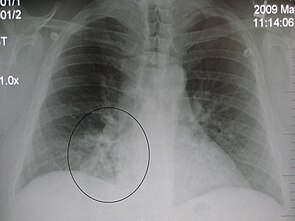Occult pneumonia is a pneumonia that is not observable directly by the eye, but can only be shown indirectly, especially by radiography. Occult pneumonia can be made visible by chest X-rays.
The general symptoms cough for more than 10 days and fever for more than 3 days can indicate the presence of occult pneumonia, just as a temperature of 39 °C or higher and a high white blood cell count.[1]
Administration of a pneumococcal vaccine decreases the incidence of occult pneumonia, which suggests that Streptococcus pneumoniae is a cause of occult pneumonia. Occult pneumonia, however, can also be the result of atypical pneumonia.[2]

Although pneumococcal vaccination lowers the prevalence of occult pneumonia, it does not make radiographic diagnosis superfluous at patients with prolonged fever, cough or leukocytosis.[1][3]
Etymology: the term is derived from the Latin occultus = hidden, secret and pneumonia = inflammation of the lungs > Greek: pneuma = wind and Indo-European: pleumon = floating, swimming.[4][5]
See also
editReferences
edit- ^ a b C.G. Murphy et al. Clinical predictors of occult pneumonia in the febrile child. Acad. Emerg. Med. 14(3), 243–249 (2007) PMID 17242382.
- ^ Commission on Acute Respiratory Diseases, Fort Bragg, North Carolina Primary Atypical Pneumonia American Journal of Public Health, April, 1944; Vol. 34
- ^ M.S. Rutman, R. Bachur, M.B. Harper Radiographic pneumonia in young, highly febrile children with leukocytosis before and after universal conjugate pneumococcal vaccination. Pediatr Emerg Care. 2009 Jan;25(1):1-7
- ^ Ioanna Ramoutsaki, Ioannis Ramoutsakis and Demosthenes Bouros Pneumonology or Pneumology? PDF [1] CHEST, May 2002 vol. 121 no. 5 1385-1387; doi:10.1378/chest.121.5.1385
- ^ van Dale, Etymologisch woordenboek; 1ste dr., 1989